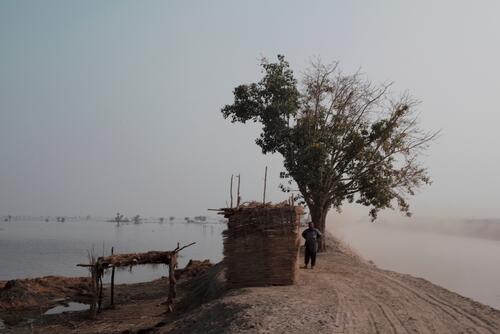Since the beginning of the floods, MSF has:
- conducted 56,991 consultations through 5 hospitals, 7 mobile clinics and 6 Diarrhoea Treatment Centres (DTC)
- treated more than 3,634 malnourished children
- distributed 1,250,400 litres of clean water per day and built 714 latrines
- distributed a total of 58,270 relief item kits and 14,538 tents
- 125 international staff are working alongside nearly 1,200 Pakistani staff in MSF’s existing and flood response programmes in Pakistan.
- MSF’s current expenditure for the emergency response to the floods has reached approximately 7 million
- MSF’s 2010 budget for normal operations in Pakistan is approximately 10,9 million
Constant population movements make it more challenging for the ambulatory feeding programme team to ensure that children admitted to the programme complete treatment.
MSF medical teams are continuing nutrition screening using the mid-upper arm circumference (MUAC) test, as well as malnutrition treatment in both Balochistan and Sindh provinces, Pakistan. In Dera Murad Jamali, where the team is running five ambulatory therapeutic feeding centres (ATFCs), the number of children enrolled in the programme increased significantly following the floods due to either food insecurity or the addition of displaced people to the local population.
So far, in Dera Murad Jamali, the team has treated 2,098 malnourished or severely malnourished children through both ATFCs and Intensive Therapy Feeding Centres (ITFCs). In Sukkur, in addition to treating at least 150 severely malnourished children in the ITFC, the team has started ATFC to cover more malnourished children in and around Sukkur. Within six days of opening, the team has admitted 148 children to the feeding programme.
In Jamshoro and Sehwan districts in southern Sindh, 2,289 children were screened with MUACs; 171 were severely malnourished and 334 were diagnosed with severe malnutrition. More than 160 children are being treated for severe acute malnutrition through the ATFC. Due to concerns about malnutrition, health promoters have changed their strategy from promoting knowledge on how to prevent acute watery diarrhea to raising knowledge on nutrition.
Since 1988, MSF has been providing medical assistance to Pakistani nationals and Afghan refugees suffering from the effects of armed conflicts, poor access to health care, and natural disasters in Khyber Pakhtunkhwa, Balochistan, Punjab, and Sindh provinces, as well as the Federally Administered Tribal Areas and Kashmir.
MSF does not accept funding from any government for its work in Pakistan and chooses to rely solely on private donations.




